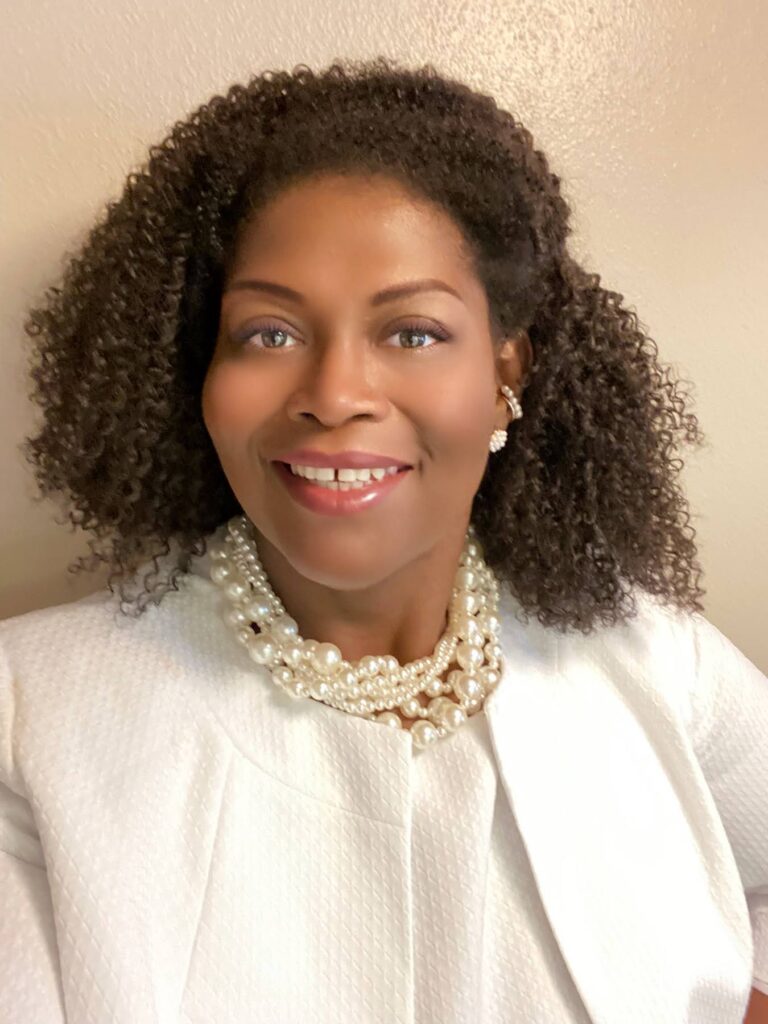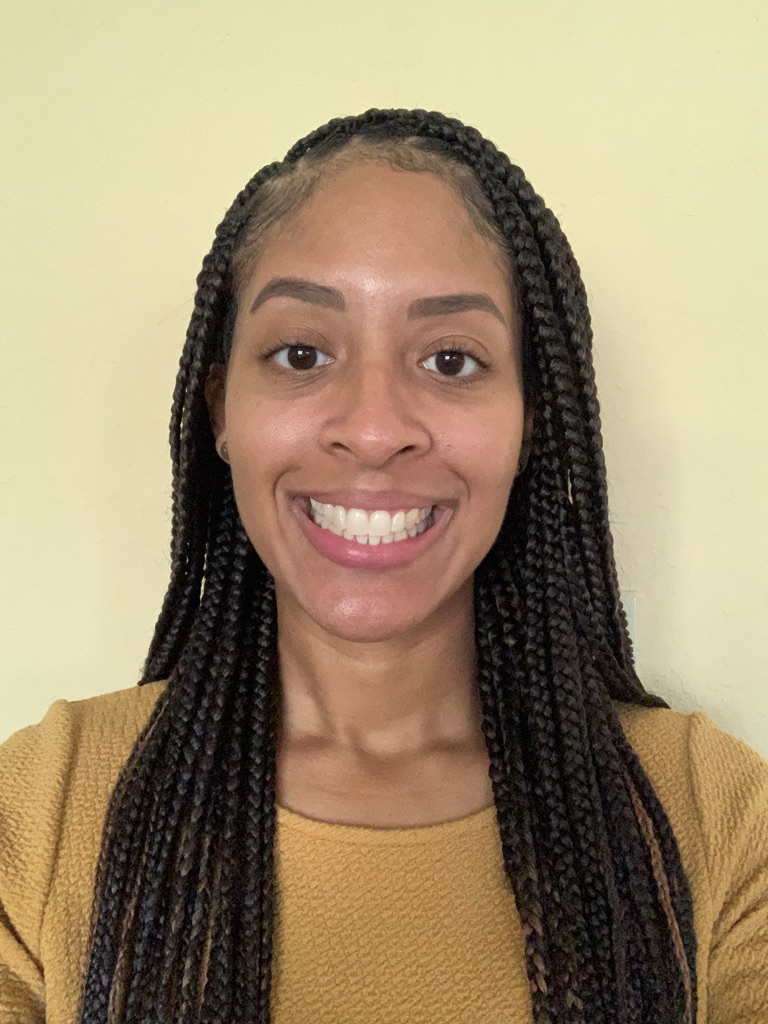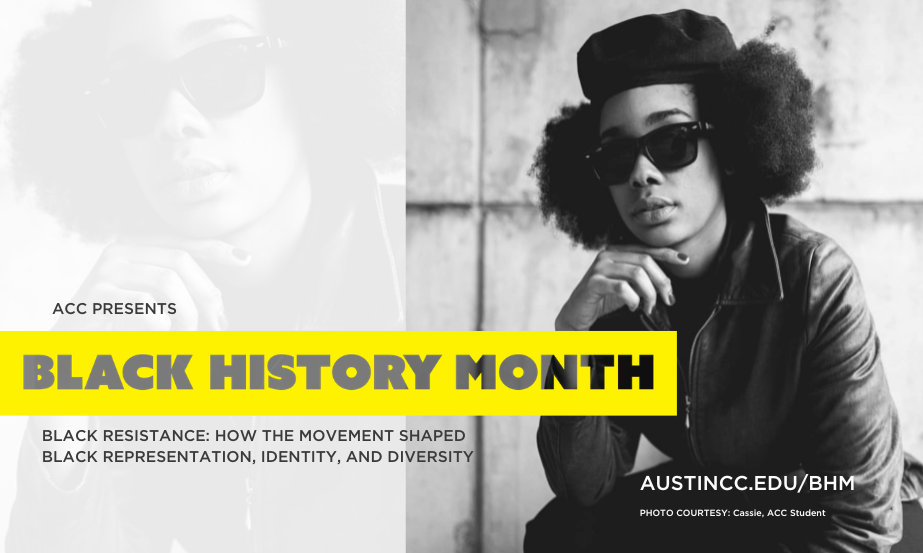Throughout February, Austin Community College District (ACC) asks influential and accomplished faculty, staff, and students to discuss Black History Month and this year’s theme of the Black Resistance movement and how it shaped Black representation, diversity, and identity.
For a list of events happening this month, visit ACC’s Black History Month webpage.
Dr. Eric Nathan
Dr. Eric Nathan is ACC’s dean of Faculty Development & Evaluation. He has been at ACC for a year and a half.

What are some personal or professional accomplishments you are most proud of?
First and foremost, raising my three kids is my best accomplishment to date. I am also proud of completing my Doctorate of Education from the University of Houston.
As far as my professional accomplishments, it was certainly an accomplishment to accept the offer here at Austin Community College to become dean of Faculty Development & Evaluation. I am a lifelong learner and, as a result, I have continued to complete job-related certificate programs such as The Chancellor’s Next Generation Leadership Program at Lone Star College; the Applying the Quality Matters Rubric (APPQMR), Peer Reviewer, and Coordinator certifications provided by Quality Matters; and, most recently, I have begun the Fostering a Culture of Belonging certification course provided by the Association of College and University Educators (ACUE).
Why do you believe it’s important for the college to commemorate Black History Month? How do you honor the month?
Black History Month is a time to recognize and honor the significant contributions that Black people have made to the world throughout history. By commemorating this month, the college can help raise awareness about the experiences, struggles, and achievements of Black individuals, which have often been overlooked or marginalized in mainstream narratives.
Furthermore, commemorating Black History Month can serve as an opportunity for the college to celebrate diversity and inclusivity, and to foster a sense of belonging among Black students, faculty, and staff. It can also provide an occasion to examine and confront issues of systemic racism and social injustice that continue to impact the Black community.
I honor Black History Month in several ways. During Black History Month, more than most months, I celebrate Black achievements and contributions. I attend different events that highlight African American art, music, dance, and/or food. I continue to engage in meaningful dialogue to promote open and honest dialogue about race, diversity, and inclusion on campus. The Faculty Development staff and I continue to facilitate workshops for faculty and staff that focus on issues related to equity, diversity, and inclusion and help build their capacity to better serve Black students.
This year ACC is exploring how the Black Resistance movement shaped Black representation, diversity, and identity. What does this theme mean to you? Why is it important?
The Black Resistance movement, which encompasses a broad range of struggles for civil rights and social justice, has had a profound impact on Black representation, diversity, and identity. The movement has challenged and transformed dominant narratives that have historically marginalized or erased Black experiences and empowered Black individuals and communities to assert their own narratives and identities.
For example, one way that the Black Resistance movement has shaped representation is by challenging the way that Black people are portrayed in the media and popular culture. By demanding more diverse and authentic representations of Black people in movies, television, and music, the movement has helped to break down stereotypes and has fostered a greater appreciation for the diversity of Black experiences.
This theme is important to me because it highlights the many ongoing struggles for us as Black people and the ways in which we, as Black people, have resisted and faced the challenges of overcoming systemic oppression. It also emphasizes the diversity and complexity of Black experiences and the importance of recognizing and celebrating our culture and diversity.
What do you feel is the hardest part about discussing race in America?
Discussing race in America can be challenging for many reasons. For example, many people are afraid of saying something that may be perceived as offensive or insensitive when discussing race. Additionally, conversations about race can be emotionally charged and can evoke strong feelings of anger, frustration, and pain. It can be challenging to navigate these emotions and to create a safe space for open and honest dialogue.
There are also differences in perspective and experience. People come from different backgrounds and have different experiences with race, which can lead to misunderstandings and conflict. It can be difficult to bridge these differences in perspective and to find common ground for understanding. Race is a complex and multifaceted issue intertwined with many other social and political issues, including history, power, privilege, and identity. It can be challenging to unpack all these complex issues and understand how they are all interconnected.
Cori Coburn-Shiflett
Cori Coburn-Shiflett joined ACC in 2022 when she started as the Manager of Educational Technology Support.

What are some personal or professional accomplishments you are most proud of?
- On the Board of Directors for one of the largest nonprofit organizations for Professionals in educational technology, Texas Computer Education Association (TCEA)
- Featured speaker at many professional conferences, including International Society for Technology in Education (ISTE) and SXSWedu
- Proud member of Sigma Gamma Rho Sorority (Mu Beta Sigma Chapter)
- M.Ed. from Lamar University
- Current Ph.D. student at the University of Arizona
Why do you believe it’s important for the college to commemorate Black History Month? How do you honor the month?
Black History Month is an opportunity for the college community to learn more about Black History and how it has contributed to the mosaic of current American culture and society. I commemorate Black History by promoting our history, cultural knowledge, and events beyond the days of February. I am very proud to share the accomplishments of my people in the fields of education and technology, and I continue that work in this age where equity is leveling the playing field to access opportunities.
This year ACC is exploring how the Black Resistance movement shaped Black representation, diversity, and identity. What does this theme mean to you? Why is it important?
Black Resistance is about Black Resilience in a continual flow of institutionalized adversity. Black Resistance has provided a pathway for other forms of representation, diversity, and identity to be acknowledged and celebrated in the world. We are all better together.
What do you feel is the hardest part about discussing race in America?
The hardest part about discussing race in America is getting people to acknowledge that race is an actual social construct that has been utilized to marginalize and justify the mistreatment of groups of people. You can’t have an honest conversation when someone says “I don’t see race.” It instantly disregards the life experiences and history of many people.
Is there a book, film, poem, painting, etc. about black resistance that you’d like to share?
“Barracoon: The Story of the Last ‘Black Cargo,’” by Zora Neale Hurston. Based on 1930s interviews, it is the firsthand account of Oluale Kossola (aka Cudju Lewis), one of the last adult survivors of the slave ships bringing enslaved people to the continental United States. It took nearly 90 years for it to be published because publishers wanted the narrative to be edited to appeal to a wider audience.
What inspires you?
My family inspires me. My ancestors have persevered for me to be here today and strive to reach for more opportunities. My mother is my hero. She grew up picking cotton and dedicated her life to being a public school educator for 40 years. She instilled the importance of civic participation even though the constitutional right to vote was only granted to her after she was already an adult.
Sidne Campbell
Sidne Campbell is a Career Pathways Coordinator at ACC Highland Campus. During her seven years at the college, she has also served as a senior Area of Study advising specialist, an advising and recruiting specialist for Adult Education, and a senior Student Financial Aid assistant.

What are some personal or professional accomplishments you are most proud of?
I am so proud to have started at ACC as a dual credit student in high school, and I am excited to still be here now, nearly 13 years later, providing services to students. I absolutely love working with students and helping them navigate college life and all that comes with it. I am also very proud of my decision to return to school in spring 2021 as I work toward earning my Master’s degree in Clinical Mental Health Counseling. When I become a Licensed Professional Counselor, I look forward to empowering my clients to live their happiest and healthiest lives.
Why do you believe it’s important for the college to commemorate Black History Month? How do you honor the month?
It is absolutely necessary for ACC to commemorate Black History Month because of the amount of trauma and turmoil in our country that pertains to unfair treatment and inequity based solely on race. Our Black students, faculty, staff, and community deserve to know and be reminded that they are attending, working at, and/or supporting an institution where they are safe and welcome just as they are in their own skin. Solidarity can be shown in numerous ways, including being present during events whose purpose is to spread knowledge and bring awareness to Black history, which is a major component of American history.
I honor Black History Month each year by working alongside my esteemed colleagues on the Black History Month planning committee to provide programming that seeks to educate, empower, and enrich every single attendee.
This year ACC is exploring how the Black Resistance movement shaped Black representation, diversity, and identity. What does this theme mean to you? Why is it important?
Highlighting the Black Resistance movement means that we recognize and commemorate the ways in which Black people peacefully expressed their disdain for the way society was treating them. Instead of listening to respond or reacting impulsively, they decided to band together and build from within. They created their own safe haven in the midst of all the hate, which was priceless and is our motivation today to create safe spaces for tough discussions during Black History Month.
There is a movement to view Black joy as a form of resistance. How do you find joy in your life?
Spending time with family and friends and traveling are both things that bring me joy. Time is such a limited resource and I appreciate all the quality time and precious moments that I get to spend with those who matter most. Outside of that, travel is my favorite activity. It has broadened my perspective on how I see the world, and I am so thankful to have been afforded these experiences. If you haven’t, I encourage you to do your own research and go out and explore all the world has to offer. Hug your loved ones and take that trip!
What do you feel is the hardest part about discussing race in America?
The most challenging part about discussing race in America is the tendency to listen to respond. Often, people listen specifically to formulate their response instead of to understand, learn, or sympathize. The only story any individual can tell best is their own, so it is extremely disheartening when someone else assumes that they know your life and what you’ve been through. My recommendation this month and beyond to everyone is to practice kindness and let people tell their stories the way that they prefer, without interruption. You never know what anyone is going through or has been through, and showing grace has the potential to bring about more positivity and understanding that can have a lasting impact for years to come. At the end of the day, “we all we got!”
To participate or nominate a student or colleague for ACC’s Black History Month interview series, email [email protected] or fill out this form.

